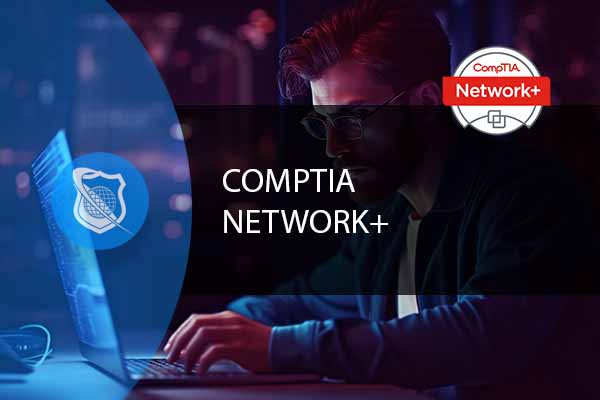What is JConsole?
Definition: JConsoleJConsole is a graphical monitoring tool that comes with the Java Development Kit (JDK). It allows developers to monitor and manage Java applications and their performance by providing information

For many IT professionals, the CompTIA Network+ certification emerges as a pivotal step in career advancement. But is it the right choice for you in 2024? This guide delves into the benefits, costs, and comparative value of this widely-recognized certification, helping you make an informed decision in your IT career journey.

CompTIA Network+ is a globally acknowledged certification, designed to validate the essential skills needed to design, manage, and troubleshoot wired and wireless networks. As a vendor-neutral credential, it stands out for its comprehensive approach, covering key areas like network infrastructure, operations, and network security. Ideal for both beginners and seasoned IT professionals, this certification lays a solid foundation for a robust career in IT infrastructure.
The CompTIA Network+ Certification is a well-regarded credential in the IT industry, specifically designed to validate a professional’s knowledge and skills in managing, maintaining, troubleshooting, installing, and configuring basic network infrastructure. To give you a detailed view, here’s a breakdown of the key aspects of the CompTIA Network+ Certification:
Remember, the CompTIA Network+ Certification, like any professional certification, undergoes periodic updates. It’s important to refer to the latest CompTIA resources or their official website for the most current information regarding the exam and its contents.
This comprehensive training series is designed to provide both new and experienced network administrators with a robust skillset enabling you to manager current and networks of the future.
Pursuing CompTIA Network+ in 2024 means aligning with the industry’s evolving standards. It’s not just about mastering network fundamentals; it’s about being equipped for tomorrow’s networking challenges. From understanding the latest in network technologies to cybersecurity principles, the certification offers a broad spectrum of knowledge, making you a valuable asset in any IT team.
Investing in the CompTIA Network+ certification requires both time and financial resources. The exam fee, along with study materials and potential training courses, can add up. However, the return on investment is significant. Certified professionals often enjoy better job prospects, higher salaries, and greater credibility in the industry, making this certification a wise investment for your future.
Holding a CompTIA Network+ certification opens doors to various roles in the IT sector. Network Administrator, Network Analyst, and Network Support Specialist are just a few of the positions where this certification is highly valued. In a field where credentials speak volumes, having Network+ on your resume sets you apart in the job market.
Success in the CompTIA Network+ exam requires a strategic study plan. Utilize a mix of study materials like books, online courses, and practice exams. Engaging in online forums and study groups can also provide valuable insights and support. For those without a background in networking, a longer preparation period may be necessary to grasp the concepts fully.
While CompTIA Network+ offers a broad understanding of networking, other certifications like Cisco’s CCNA focus on vendor-specific knowledge. The choice between a vendor-neutral and a vendor-specific certification depends on your career goals and the specific technologies you wish to master. Network+ serves as a solid foundational base, beneficial for any IT professional.

Learn concrete vendor neutral Network fundamentals in our comprehensive CompTIA Network+ traning course.
The skills gained from the CompTIA Network+ certification are not just theoretical. They are highly applicable in real-world scenarios, from troubleshooting network issues to implementing security measures. These practical skills are crucial for any IT professional looking to make an impact in their workplace.
The CompTIA Network+ certification equips professionals with a variety of skills that are highly applicable and valuable in real-world IT environments. Below are key areas where the skills and knowledge gained from the Network+ certification can be practically applied:
The CompTIA Network+ certification prepares professionals not only with technical knowledge but also with a mindset geared towards problem-solving, adaptability, and continual learning. These skills are crucial for tackling the diverse and evolving challenges in the field of IT networking.
To maintain the CompTIA Network+ certification, professionals must either retake the exam every three years or participate in the Continuing Education program. This requirement ensures that certified individuals stay current with the latest in network technology and practices, making them perpetually valuable in an ever-evolving field.
Deciding whether CompTIA Network+ is right for you depends on your career objectives and professional development plan. If you’re seeking to establish a strong foundation in networking and wish to remain versatile in the IT industry, this certification could be a pivotal step in your career.
Understanding key terms related to the CompTIA Network+ certification is crucial for anyone preparing for the exam or working in the field of network administration and support. These terms form the foundation of network concepts, practices, and technologies, enabling professionals to communicate effectively and understand the intricacies of network systems.
| Term | Definition |
|---|---|
| LAN (Local Area Network) | A network that connects computers and devices in a limited geographical area, such as a home, school, or office building. |
| WAN (Wide Area Network) | A network that covers a broad area, such as a city, country, or global connections, using leased telecommunication lines. |
| TCP/IP (Transmission Control Protocol/Internet Protocol) | The foundational protocols that enable communication over the internet and other networks. |
| DHCP (Dynamic Host Configuration Protocol) | A network management protocol used for automating the process of configuring devices on IP networks. |
| NAT (Network Address Translation) | A method for modifying network address information in IP packet headers while in transit across a traffic routing device. |
| Subnetting | Dividing a network into smaller, more manageable sub-networks. |
| VLAN (Virtual Local Area Network) | A group of devices on one or more LANs that are configured to communicate as if they were attached to the same wire, when in fact they are located on a number of different LAN segments. |
| OSI Model (Open Systems Interconnection) | A conceptual model that characterizes and standardizes the communication functions of a telecommunication or computing system without regard to its underlying internal structure and technology. |
| Ethernet | A family of computer networking technologies commonly used in local area networks (LAN), metropolitan area networks (MAN) and wide area networks (WAN). |
| VPN (Virtual Private Network) | A technology that creates a safe and encrypted connection over a less secure network, such as the internet. |
| Firewall | A network security device that monitors and filters incoming and outgoing network traffic based on an organization’s previously established security policies. |
| IP Address | A unique address that identifies a device on the internet or a local network. |
| IPv4/IPv6 (Internet Protocol version 4/version 6) | The fourth and sixth versions of the Internet Protocol, which provide an identification and location system for computers on networks and routes traffic across the internet. |
| DNS (Domain Name System) | The hierarchical and decentralized naming system used to identify computers, services, and other resources reachable through the internet or a private network. |
| Routing | The process of selecting a path for traffic in a network or between or across multiple networks. |
| Switch | A networking device that connects devices together on a computer network by using packet switching to receive and forward data to the destination device. |
| Wireless Networking | A method by which homes, telecommunications networks, and business installations avoid the costly process of introducing cables into a building or as a connection between various equipment locations. |
| Network Topology | The arrangement of the elements (links, nodes, etc.) of a communication network. |
| QoS (Quality of Service) | The description or measurement of the overall performance of a service, particularly the performance seen by the users of the network. |
| SNMP (Simple Network Management Protocol) | An Internet Standard protocol for collecting and organizing information about managed devices on IP networks and for modifying that information to change device behavior. |
These terms are essential for understanding and working with network technologies, and they form the backbone of the knowledge needed to excel in roles related to network administration, support, and security.
The CompTIA Network+ certification trains professionals in systematic troubleshooting methodologies, equipping them with skills to diagnose and resolve a wide range of network issues, including connectivity problems, hardware malfunctions, and configuration errors. It emphasizes practical, hands-on problem-solving techniques that are applicable in real-world IT environments.
Yes, the skills and knowledge acquired through the CompTIA Network+ certification are versatile and applicable to networks of all sizes. From basic network setup for small businesses to more complex network management in large enterprises, the certification covers essential concepts and practices relevant across various network environments.
CompTIA Network+ provides a solid foundation in network security, covering essential practices and protocols to protect networks against common threats. While it offers a strong base, dealing with advanced or highly specialized cybersecurity challenges may require further education and certifications in cybersecurity-specific fields.
The certification includes fundamental concepts of cloud computing and virtualization, focusing on how these technologies impact network management and operations. This knowledge is crucial for professionals working in environments where cloud services are integrated with traditional networking infrastructure.
Alongside technical skills, CompTIA Network+ also emphasizes critical soft skills such as effective communication, problem-solving, and teamwork. These skills are essential for IT professionals to collaborate effectively with team members, manage projects efficiently, and convey technical information to non-technical stakeholders.
Lorem ipsum dolor sit amet, consectetur adipiscing elit. Ut elit tellus, luctus nec ullamcorper mattis, pulvinar dapibus leo.
$49.99 Original price was: $49.99.$16.99Current price is: $16.99. / month with a 10-day free trial
Definition: JConsoleJConsole is a graphical monitoring tool that comes with the Java Development Kit (JDK). It allows developers to monitor and manage Java applications and their performance by providing information
Definition: High Availability ClusterA High Availability Cluster, often abbreviated as HA Cluster, is a group of computers that work together to ensure that critical applications and services are available with
Definition: YubiKeyA YubiKey is a hardware authentication device manufactured by Yubico that provides secure access to various digital services and systems. It is used to enhance security by implementing two-factor
Definition: Keyed HashA keyed hash, also known as a keyed-hash message authentication code (HMAC), is a type of cryptographic hash function that includes a secret key as part of the
Definition: JuliaJulia is a high-level, high-performance programming language specifically designed for numerical and computational science. Developed with the goal of addressing the needs of high-performance numerical analysis and computational science
Definition: TCP WrappersTCP Wrappers is a security tool used to filter network access to Internet-based services on Unix-like operating systems. It provides host-based access control and logging features to enhance
Definition: JolokiaJolokia is a JMX-HTTP bridge that provides an efficient way to access Java Management Extensions (JMX) MBeans through HTTP/HTTPS. It allows remote JMX operations over HTTP using a REST-like
Definition: JSF (JavaServer Faces)JavaServer Faces (JSF) is a Java-based web application framework intended to simplify development integration of web-based user interfaces. JSF is part of the Java EE (Enterprise Edition)
Definition: Generic Top-Level Domain (gTLD)A Generic Top-Level Domain (gTLD) is one of the categories of top-level domains (TLDs) in the Domain Name System (DNS) of the Internet. gTLDs are the
Definition: Apache HadoopApache Hadoop is an open-source framework designed for distributed storage and processing of large data sets across clusters of computers using simple programming models. It is part of
Definition: Google Kubernetes Engine (GKE)Google Kubernetes Engine (GKE) is a managed environment for deploying, managing, and scaling containerized applications using Google Cloud infrastructure. It is based on Kubernetes, an open-source
Definition: Keyboard ShortcutA keyboard shortcut is a combination of keys on a keyboard that performs a specific function or command within software or an operating system. These shortcuts are designed
ENDING THIS WEEKEND: Train for LIFE at our lowest price. Buy once and never have to pay for IT Training Again.

Get ready for the updated 220-1201 & 220-1202 exams with our brand-new CompTIA A+ training—designed to help you pass with confidence and start your IT career strong. Access this course and over 2,900 hours of expert-led IT training when you sign up for any of our All-Access Passes. Don’t miss out—enroll now and start learning today!